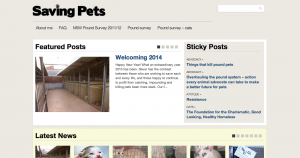Labs and Goldens: Goldens get cancer better
A recent study, published in July this year, considered desexing in Labradors and Golden Retrievers and the long term health effects. This study doesn’t find anything revolutionary, but adds to the building body of evidence on the health impacts of desexing.
In the US, 83% of dogs are desexed, and often desexing is performed before 6 months of age. The popularity of this elective surgery has increased over the last 30 years. This is in contrast to many European countries, where animals are left intact.
This study considered 1015 Golden Retrievers and 1500 Labrador Retrievers. It used data on all Labs and Goldens admitted to a hospital between 2000 and 2012 (retrospective data). It mirrors a study on Goldens in 2013, and came up with similar results (which makes sense as it used a similar data set).
Dogs in the study were split by breed, then split by neuter status and age of neutering. So in each breed, there is a) desexed at <6 months, b) desexed at 6-11 months, c) desexed at 1 year, d) desexed at 2-8 years, and e) entire. (Dogs desexed at over 8 years were excluded from the study.)
While the study looked at lots of conditions, in particular it considered: hip dysplasia, cranial cruciate ligament tear, hemangiosarcoma, mast cell tumor, and mammary cancer. At times, the study lumped together ‘joint disorders’ and ‘cancers’, with the logic: Surely if we want to avoid any and all, not just one type of cancer or one type of joint disorder!
 On Joint Disorders
On Joint Disorders
In both goldens and labs, the incidence of joint disorders in intact dogs (male and females) was about 5%.
Overall, though, it was found the earlier a dog was desexed, the greater the incidence of joint disorders.
In Labrador Retrievers, neutering at earlier than 6 months doubled (to 12.5% in males) the incidence of one or more joint disorder. Golden Retrievers faired even worse, with the same neuter-group having 4-5 times (27%) the incidence of one or more joint disorder.
Basically, there was a sliding scale: Golden Retriever males/females desexed at 6-11 months had a 14%/13% incidence of joint disorders. Golden Retriever males desexed at 2-8 years had a 10% incidence of joint disorders. While figures for Labrador Retrievers were not as high, they had a similar trend.
So, it seems from these results, the longer a dog is left entire, the healthier their joints.
On Cancers
While males in both breeds got off lightly when it came to neutering and cancer, and female Labradors were not much different, female Golden Retrievers drew the short straw.
There seems to be a ‘protective effect’ from gonadal hormones against cancers, especially in female golden retrievers.
The results reveal that neutering through 8 years of age [in female golden retrievers] increases the risk of acquiring at least one of the cancers at a level 3-4 times that of leaving the female dog intact.
Mast cell tumours didn’t occur in entire Golden Retriever bitches, but occurred at a rate of 6% in neutered bitches. Other cancers (lymphosarcoma, mast cell tumours, and hemangiosarcoma), in Golden Retrievers, also occurred more frequently in spayed than entire bitches.
Mammary cancers were only seen in Golden Retriever bitches (not in Labradors). 1.4% of intact female goldens were diagnosed with mammary cancer. If the bitch was neutered between 2-8 years, the incidence was increased to 2%.
Pyometra!
Exclamation because I haven’t seen consideration given to pyo’ before in one of these studies. A good start!
In Golden Retrievers, the incidence of pyometra in intact females was 1.8%.
In Labrador Retrievers, the incidence of pyometra in intact females was <4%.
Conclusions
It’s interesting that, while the Golden Retriever and Labrador Retriever are similar in looks, function, and size, it’s interesting that they have such a marked difference in terms of their incidence of joint disorders and cancers.
For example, Goldens neutered at <6 months had a 20-27% incidence of joint disorders, while Labradors neutered at <6 months had a 11-12% incidence.
…for both breeds, neutering at the standard <6mo. period markedly and significantly increased the occurrence of joint disorders, although the increase was worse in the Golden than the Labrador.
Again, it’s important to recognise this is only part of a growing body of research looking at the long-term implications of desexing. We have had studies before that have suggested:
- Desexed Golden Retrievers are two times more likely to experience joint disorders, and three times more likely to experience cancers, than their entire counterparts. (link)
- In Vizslas, there is a higher incidence of cancer (mainly lymphosarcoma, hemangisoarcoma, and mast cell tumours) in desexed dogs than those intact. (link)
- Osteosarcoma is two times more common in neutered dogs relative to intact dogs.
- In Rottweilers, osteosarcoma was 3-4 times more likely to occur in rotties desexed before 1 year of age.
- Cardiac and splenic hemangiosarcoma has a four and two times (respectively) greater incidence in spayed than intact females.
- There is a higher incidence of lymphosarcoma in neutered females than intact.
- Prostate cancer is four times more common in neutered males as intact males.
- Cutaneous mast cell tumours are four times greater in incidence in spayed females than intact females.
One of the big arguments for desexing bitches is the fear of pyometra and mammary cancer in bitches. This study adds to growing evidence that mammary cancer isn’t as prolific as first thought. If you have an entire golden retriever bitch, your likelihood of experiencing mammary cancer or pyometra is 2.2%. If you have an entire labrador retriever bitch, your likelihood of experiencing mammary cancer or pyometra is less than 4%.
While many of the studies mentioned above are to do with cancers, there is evidence regarding the impacts of desexing on joints as well.
“The effects of neutering in the first year of a dog’s life, especially in larger breeds, undoubtedly reflects the vulnerability joints to delayed closure of long-bone growth plates from gonadal hormone removal”
Studies like this have implications for studies of cancers over all. It is useful for us to examine what dog breeds have which types of cancer, for future research purposes.
This study did not look at cognitive decline accelerated by neutering, but acknowledges that there is some evidence for this and it is a field for further study.
The Study:
Hart, B., Hart, L., Thigpen, A., & Willits, N. (2014). Long-Term Health Effects of Neutering Dogs: Comparison of Labrador Retrievers with Golden Retrievers PLoS ONE, 9 (7) DOI: 10.1371/journal.pone.0102241
Further reading:
Potential Risks of Neutering and Age at Neutering for Golden Retrievers and Labrador Retrievers



